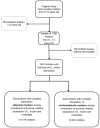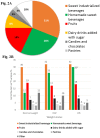High Relative Abundance of Lactobacillus reuteri and Fructose Intake are Associated with Adiposity and Cardiometabolic Risk Factors in Children from Mexico City
- PMID: 31141963
- PMCID: PMC6627236
- DOI: 10.3390/nu11061207
High Relative Abundance of Lactobacillus reuteri and Fructose Intake are Associated with Adiposity and Cardiometabolic Risk Factors in Children from Mexico City
Abstract
In Mexico, 3 of 10 children are overweight. Fructose intake and relative abundance (RA) of Lactobacillus reuteri (L. reuteri) in the intestinal microbiota are associated with obesity and diabetes in adults, but studies in children are limited. This study evaluates the association between fructose intake and L. reuteri RA with adiposity and cardiometabolic risk markers in Mexican children dietary information, microbiota profiles, adiposity indicators (Body Mass Index, BMI and Waste Circumference, WC), and cardiometabolic markers were analyzed in 1087 children aged 6-12 years. Linear regression and path analysis models were used. High-tertile fructose intake and L. reuteri RA were positively associated with BMI (βTertil 3 vs. Tertil 1 = 0.24 (95% CI, 0.04; 0.44) and βT3 vs. T1 = 0.52 (95% CI, 0.32; 0.72)) and WC (βT3 vs. T1 = 2.40 (95% CI, 0.93; 3.83) and βT3 vs. T1 = 3.40 (95% CI, 1.95; 4.90)), respectively. Also, these factors mediated by adiposity were positively correlated with high triglycerides and insulin concentrations and HOMA-IR (p ≤ 0.03) and negatively associated with HDL-C concentration (p < 0.01). High-tertile fructose intake and L. reuteri RA were directly associated with adiposity and indirectly associated though adiposity with metabolic disorders in children. In conclusion, fructose intake and L. reuteri RA were directly associated with adiposity and indirectly associated with metabolic disorders in children, mediated by adiposity.
Keywords: Lactobacillus reuteri; adiposity; cardiometabolic markers; children; cholesterol; fructose.
Conflict of interest statement
Eira E. Huerta-Ávila, Ivonne Ramírez-Silva, Luisa E. Torres-Sánchez, Cinthya E. Díaz-Benítez, Yaneth C. Orbe-Orihuela, Alfredo Lagunas-Martínez, Marcia Galván-Portillo, Mario Flores, Miguel Cruz, and Ana I. Burguete have no conflicts of interest.
Figures


References
-
- World Health Organization Obesity and overweight. [(accessed on 2 May 2018)]; Available online: https://www.who.int/news-room/fact-sheets/detail/obesity-and-overweight.
-
- Organization for Economic Cooperation and Development O. Obesity update. [(accessed on 2 May 2018)]; Available online: https://www.oecd.org/els/health-systems/Obesity-Update-2017.
-
- Sievenpiper J.L., de Souza R.J., Mirrahimi A., Yu M.E., Carleton A.J., Beyene J., Chiavaroli L., di Buono M., Jenkins A.L., Leiter L.A., et al. Effect of fructose on body weight in controlled feeding trials: A systematic review and meta-analysis. Ann. Intern. Med. 2012;156:291–304. doi: 10.7326/0003-4819-156-4-201202210-00007. - DOI - PubMed
MeSH terms
Substances
Grants and funding
LinkOut - more resources
Full Text Sources
Medical

